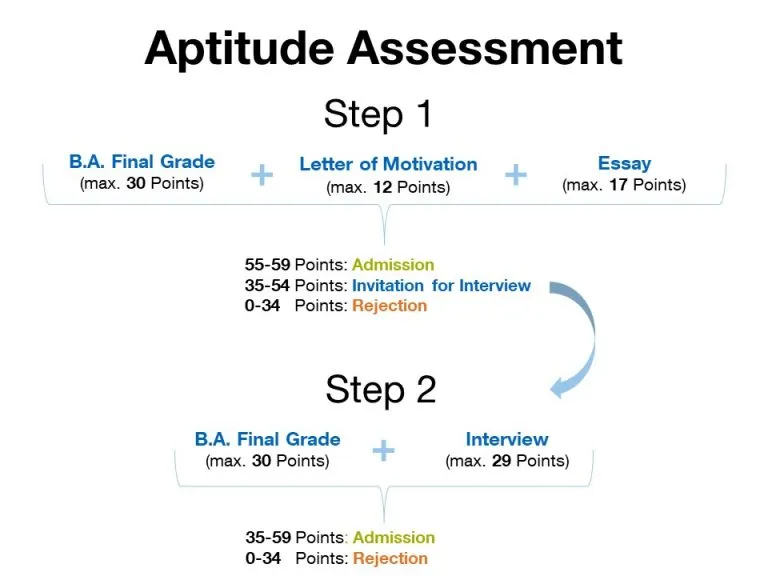Eligibility Requirements
The eligibility for the Master’s program in Responsibility in Science, Engineering and Technology (RESET) is demonstrated by:
1. Holding a Bachelor’s or equivalent degree in one of the following fields: social sciences, psychology, the humanities, economics, STEM (science, technology, engineering or mathematics), life sciences, medicine or law.
2. Verification of 8 credits worth of courses in theories and methods of social science. If this prerequisite is unfulfilled, students have to take a special preparatory course at the beginning of their first semester. Please note that the application form “Verification of the Successful Participation in Modules on Methods and Theories of Social Sciences” needs to be filled out irrespective of whether proof can be provided or not (please tick the respective box on the form) and that the filled-out form will be assessed within the aptitude assessment process.
3. Adequate knowledge of the English language; students whose native language is not English must demonstrate proficiency through an acknowledged language test such as
- “Test of English as a Foreign Language“ (TOEFL) (with at least 88 points)
- “International English Language Testing System” (IELTS) (with at least 6,5 points) or
- “Cambridge Main Suite of English Examinations” (CAE or CPE, grades A, B, C)
Alternatively, adequate language skills may be proven if 12 credits were obtained in the Bachelor’s program for courses held in English (in this case, an official document from the university has to be submitted stating that the courses and the respective exams were held entirely in English).
4. Passing the aptitude assessment pursuant to Appendix 2 of the Examination and Academic Regulations for the Master’s Program Responsibility in Science, Engineering and Technology (RESET).
FIRST STEP
- Application for admission in TUMonline
- You can find general information regarding the application process and a list of the necessary documents here.
- The template for the list of best credits (analysis of curricula) and the form for proof of successful participation in a module in the field of social-scientific methodology can be downloaded from the application portal.
SECOND STEP
Submission of documents by the end of the application deadline.
Essay questions for the application period 01 January – 31 May 2025 (for admission in the winter semester 25/26)
Please write an essay on one of the following topics (1-3 A4 pages (excluding references), Arial 11, line spacing 1.5; Harvard system of referencing):
Question 1
Accessibility is a central concern in a wide range of contexts including architecture and building design, city planning, transportation, and recreation, among others. Reflect on accessibility issues in a context with which you are personally familiar (e.g. planning or development change, particular aspects of buildings/built environment or mobility systems where you live/lived; you can also reflect on accessibility challenges you have observed or experienced). What issues of responsibility does accessibility raise in your chosen context? Define a research question(s) to explore these issues that considers the intersections of science, technology, and society. Briefly outline an approach you might take (methods, data, theoretical framework) to explore this question(s). What tentative results do you think you might find?
Question 2
In the face of growing environmental, economic, and geopolitical concerns, various actors (e.g. governmental, corporate, institutional, individual) have tried or are trying to create new solutions for producing and consuming energy. Reflect on energy issues in a context with which you are personally familiar (e.g. predominant forms of energy production (e.g. electricity, heating, fuel) where you live/lived, the local face of "energy transitions," political contestation over energy; you are also invited to reflect on your own energy consumption practices). What issues of responsibility does energy raise in your chosen context? Define a research question(s) to explore these issues that considers the intersections of science, technology, and society. Briefly outline an approach you might take (methods, data, theoretical framework) to explore this question(s). What tentative results do you think you might find?
The essay is assessed according to the criteria a) spelling and grammar, b) identifying, describing and reflecting upon complex interrelations between technology, science and society by using specific examples, c) formulating relevant issues and questions, d) outlining an appropriate research idea
Please note that your essay and letter of motivation has to be your own unaided work, and that all direct or indirect sources used are acknowledged as references. Your work can be examined for the use of unauthorized aid and in order to determine whether your work as a whole or parts of it may be deemed as plagiarism. Any attempt of deception/plagiarism will be penalized.
Letter of Motivation
A written statement (1-2 A4 pages) of the reasons for choosing the RESET program at the Technical University of Munich in which the candidate explains the specific abilities and interests that make him/her particularly qualified for the program. This statement is assessed according to the criteria a) language, b) demonstration of eligibility and motivation e.g. through program-related extracurricular activities, vocational training, internships or stays abroad, c) link between personal interests and the RESET program.
Detailed information concerning the eligibility requirements, the necessary documents and the aptitude assessment procedure can be found in the Examination and Academic Regulations for the Master’s Program “Responsibility in Science, Engineering and Technology”. Only the German version of the regulations is legally binding.
THIRD STEP
Direct admission, direct rejection or interview depending on the number of points you have acquired.

If you need information about how to convert your foreign grades into the German grading system, please visit this website. You can use the calculation form to convert your grades. Please note, however, that the outcome only serves as orientation and is not legally binding.